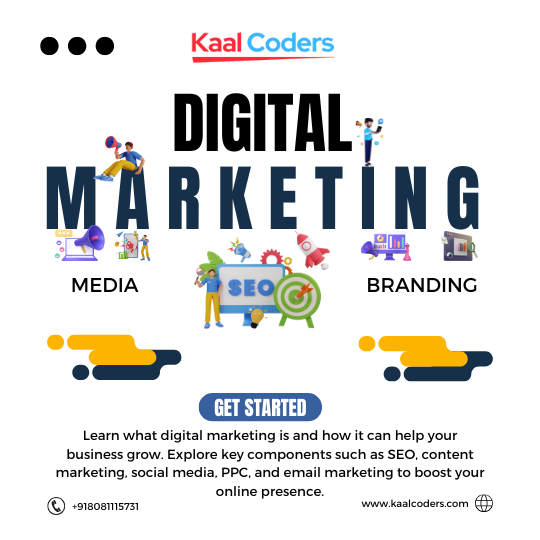What is Digital Marketing? An In-Depth Guide
In today’s digital age, businesses of all sizes are leveraging the power of digital marketing to reach their target audience, drive brand awareness, and boost sales. But what exactly is digital marketing, and why is it so essential for businesses? In this blog, we'll break down the concept of digital marketing, its various components, and how it can help your business grow.
What is Digital Marketing?
Digital marketing refers to the use of digital channels and platforms to promote or advertise products and services to potential customers. Unlike traditional marketing methods, digital marketing involves the internet and electronic devices, making it more dynamic and interactive.
Digital marketing encompasses a wide range of tactics and strategies that help businesses communicate and engage with their target audience online. It includes everything from social media marketing to email campaigns and content creation to paid advertising.
Key Components of Digital Marketing
Search Engine Optimization (SEO)
SEO is the process of optimizing your website to rank higher in search engine results pages (SERPs) for relevant keywords. The higher your website ranks, the more likely it is that potential customers will find you. SEO involves both on-page (content optimization, keyword research) and off-page (backlink building, social signals) strategies.
Content Marketing
Content marketing focuses on creating and distributing valuable, relevant, and consistent content to attract and engage a target audience. This can include blog posts, videos, infographics, podcasts, and social media updates. The goal is to provide useful information that educates and nurtures potential customers, ultimately leading to conversions.
Social Media Marketing (SMM)
Social media marketing involves using platforms like Facebook, Instagram, Twitter, LinkedIn, and TikTok to promote your business. Through organic posts and paid ads, businesses can engage directly with their audience, build brand awareness, and drive traffic to their website.
Pay-Per-Click (PPC) Advertising
PPC advertising, such as Google Ads, allows businesses to bid for ad placement on search engines or websites. Advertisers pay each time their ad is clicked. PPC campaigns can generate immediate traffic and are highly measurable, allowing businesses to track their ROI (Return on Investment).
Email Marketing
Email marketing involves sending targeted messages to a specific group of individuals via email. It's a great way to build relationships, share offers, announce product launches, or nurture leads. With email marketing, businesses can send personalized messages and track customer engagement.
Affiliate Marketing
Affiliate marketing is a performance-based strategy where businesses reward affiliates (partners) for driving traffic or sales to their website. Affiliates promote your products and earn commissions based on sales or leads generated through their referrals.
Online Public Relations (PR)
Online PR focuses on managing a brand's online reputation. This includes engaging with online influencers, managing reviews, and building relationships with journalists and bloggers. Positive online PR can enhance a business’s credibility and foster trust with potential customers.
Influencer Marketing
Influencer marketing involves collaborating with influencers (individuals with a large following on social media or blogs) to promote your products or services. Influencers can help amplify your message and reach a wider audience, especially when they align with your brand's values and target demographic.
Why is Digital Marketing Important?
Cost-Effective
Compared to traditional marketing methods, digital marketing is often more affordable. Small businesses can run effective campaigns on a limited budget and still see significant results, especially with channels like social media and email marketing.
Global Reach
Digital marketing allows businesses to reach a global audience. With the right digital strategy, you can target customers across the world, breaking geographical boundaries and expanding your market.
Measurable Results
One of the key advantages of digital marketing is that it’s highly measurable. Businesses can track the performance of every campaign, whether it’s the number of clicks on an ad, conversions from an email campaign, or engagement on social media. This data allows for continuous optimization and better decision-making.
Targeted Audience
Digital marketing allows businesses to tailor their messages and target specific customer segments based on demographics, interests, and behaviors. This level of targeting ensures that businesses are reaching the right people at the right time.
Customer Engagement
Digital marketing offers businesses a chance to engage directly with their customers through social media, email, or live chat. This level of interaction fosters relationships, builds brand loyalty, and helps businesses better understand their customers' needs.
Conclusion: Harnessing the Power of Digital Marketing
Digital marketing is essential in the modern business landscape. It allows businesses to connect with customers where they spend the most time – online. By utilizing various digital marketing strategies, businesses can increase their visibility, drive traffic to their website, and convert leads into loyal customers.
At Kaal Coders, we specialize in providing digital marketing solutions tailored to your business's needs. From SEO and PPC to content marketing and social media management, we help you grow your business in the digital world. If you're ready to take your business to the next level, contact us today to get started with a personalized digital marketing plan.

